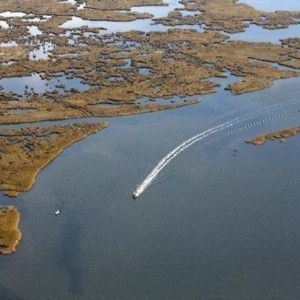
A pump jack operates in the Banning Ranch oil field, where a controversial housing and hotel development is proposed in Newport Beach, CA. Image: Allen J. Schaben/Los Angeles Times.
To say that the California Coastal Commission has been in something of an upheaval in recent months is an understatement. The insanity even rubbed off on me and one of the boards I serve on (but that is a story for later). The ouster of the Commission’s Executive Director in closed-doored session and with barely any explanation earlier this year was widely seen as a power play by interests favoring less protection and promoting development. I sit on a state panel looking into the interrelationship between multiple stressors to our coastal zone; pollution, oil and gas extraction, housing construction, etc. All of these have a clear nexus in the California Coastal Commission, the most powerful land management agency on the planet (or so said the U.N. a few years ago). Consequently, the goings on at the Commission have a strong influence on oil and gas extraction.

Alex Lowe, left, and Rob Moddlemog from Orange County hold a surf board as members of the California Coastal Commission listen to speakers in support of Charles Lester. Image: Al Seib/Los Angeles Times.
In response to that, we have seen a huge backlash amongst the coastal conservation crowd, both in the NGO world and legislature. Here is a quick run-down of the most recent pending legislation (courtesy of CalCoast’s Wave):
- SB 1190 (Jackson) This bill would ban ex parte communications with coastal commissioners. It would also amend the Coastal Act to ensure that commissioners or alternates do not attempt to influence, change, or alter a staff report, analysis, or recommendation prior to the time the staff report is made public at a hearing or other official proceeding. Violations of this provision would be subject to a fine of $1000 or imprisonment and a violator would be disqualified forever from holding any office in California. Read a list of supporters (there are no stated opponents), as well as the most recent staff analysis of the bill here. (Currently in Senate Appropriations)
- AB 2002 (Stone) provides that communicating with the Coastal Commission in order to influence specified actions can result in a person being considered a “lobbyist” under the Political Reform Act (PRA). Also, the bill prohibits an ex parte communication with a member of the commission regarding a matter during the 24 hours before that matter will be discussed at a commission hearing. Read a list of supporters and opponents, as well as the most recent staff analysis of the bill here. (Currently in Assembly Appropriations)
- AB 2185 (Gonzalez) requires the State Coastal Conservancy to assist the Coastal Commission in developing a program to provide loans or grants to meet the operation and maintenance needs of private low-cost coastal accommodations. Millions of dollars in “in lieu” fees remain un-spent. AB 694 (Rendon, 2015) was almost identical to this bill and died in Assembly Appropriations. Read a list of supporters (there are no stated opponents), as well as a staff analysis of the bill here. (Currently in Assembly Appropriations)
- AB 2616 (Burke) increases Coastal Commission membership by three members who are required to work directly with communities in the state that are most burdened by, and vulnerable to, high levels of pollution and issues of environmental justice. Allows the commission to address affordable housing and environmental justice concerns. Read a list of supporters (there are no stated opponents), as well as a staff analysis of the bill here. (Currently in Assembly Appropriations)
- AB 2658 (Maienschein) requires Coastal Commission staff to disclose in their staff reports any communication on a matter before the commission between the staff member acting in his or her official capacity and an interested person. The bill also requires video or audio recordings of all hearings, workshops, or other proceedings to be posted on the commission’s internet website within 72 hours of the proceeding, as well as written and electronic communications submitted to the commission as part of a proceeding to be posted on the commission’s website with seven days of receipt. Read a list of opponents (there are no stated supporters), as well as the most recent staff analysis of the bill here. (Currently in Assembly Appropriations but not likely to pass out of that committee).





Leave a Reply